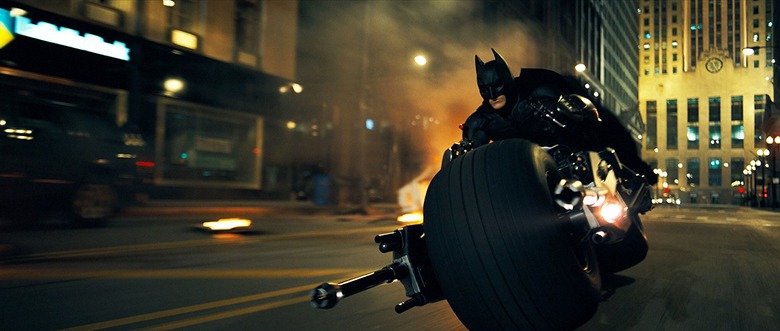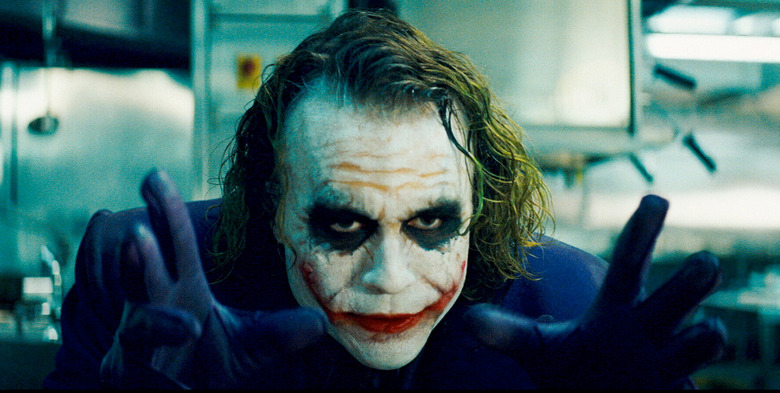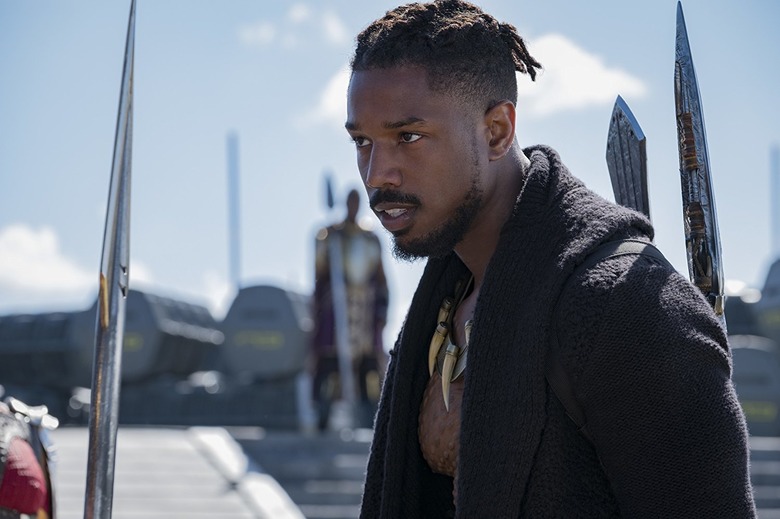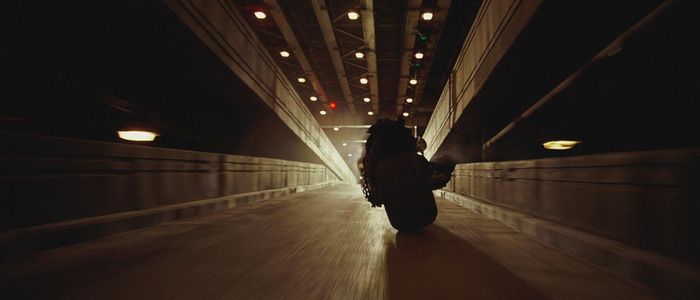What Other Superhero Movies Can Learn From Batman And The Joker In 'The Dark Knight'
(Welcome to The Dark Knight Legacy, a series of articles that explore Christopher Nolan's superhero masterpiece in celebration of its 10th anniversary.)
It's considered a cliché to say that the Joker is not only Batman's greatest villain, but the greatest villain in comic book history. But is it really? It's not as if The Joker's status as top villain isn't earned; he's consistently kept fans enthralled for decades with his mix of actual comedy and misanthropy, and while his level of nihilism has changed throughout the years, his core message to Batman – that good only exists where there's evil – remains.
That message rose to its height in The Dark Knight, which brought us the best portrayal of the Joker onscreen (yes, even better than Jack Nicholson). Heath Ledger's portrayal of the Clown Prince of Crime elevated the character from mere "comic book legend" to a relevant and thought-provoking icon, challenging Batman on his core tenets of being a superhero and, indeed, of being a person on the side of good. It's this challenge that makes the Joker and Batman's dynamic the best in comic book movie history – and why Marvel, for all it's Infinity War fervor, needs to sit down and learn a thing or two about how to craft villains with longevity and meaning, meaning that sticks with the viewer long after the ending credits have rolled.
A debate on the human condition
If we were to take out the fact that the Joker kills tons of people and has even more lives at stake by the end of The Dark Knight, we can boil the film down to just being a long debate between philosophical opposites striving to prove the meaning of life.
For Batman, life is something that's precious, and even though he's taking it upon himself to change the world – a darker reading of Batman is that he as an unchecked Messiah Complex – he still believes that everyone should be deserving of the chance to live a good life. Ultimately, he believes that people are inherently good at heart, and that all that's needed for the world to thrive is for evil threats to be stamped out.
Meanwhile, the Joker is saying something completely different. Whereas Batman thinks people are inherently good, the Joker things humanity is inherently evil and, when given the chance, humanity would easily and happily divulge in it's Purge-like fantasies. Indeed, whereas Batman thinks what happens in The Purge is what happens when bad people don't follow the rules, the Joker asserts that The Purge is actually humanity's true nature, and that laws are just part of the mask society wears to feel better about itself.
I feel like most people stop analyzing Heath's Joker at this level, but Joker's nihilism is just the surface of what makes him Batman's greatest foe and comic book film's greatest villain. The Joker doesn't just live by his own motto about life; he routinely sets it in order, directly challenging Batman on two different levels. First, it's the physical component – can one man save a group of people when the odds are stacked against him? That's a typical component for a comic book movie. But the second component, the mental element, is where it gets interesting. What the Joker is essentially asking Batman is should he try to save everyone? Is Bruce Wayne, not Batman, enough for Gotham? Is one man capable of fulfilling his destiny, and is that destiny even worth it in the end? If the Joker were to have his say, he'd say Batman should give up trying to be a savior, that his goal of doing right by Gotham is a fool's errand, and why engage in all the trouble anyway when at their core, humanity is a doomed, animalistic race set on killing themselves?
It's not an unusual conclusion to say that all superhero myths can be seen as religious analogies, but since I've been pondering more on Christianity lately, thinking about Batman has put some of my own thoughts about Christianity into some perspective. Pastors will often say that the devil taunts because he wants to destroy what God has summoned you to do, that he wants to cheat you out of your destiny. The devil, in this sense, are those existential questions that we ask ourselves, especially when we're feeling low – do we deserve to believe in ourselves? Do we deserve to think better of ourselves? Do we have the capacity to be a force of good, and even if we are, what does it serve in the long run, especially if our lives as humans are so short and pales in comparison to the grandness and mystery of the universe. The conundrum is, in short, does anything we do matter?
The Joker asks this question of Batman over and over and over again, not just in The Dark Knight, but throughout his career as a villain in the pages of comic books and in animated DC films. The ultimate victory for the Joker is to break Batman, either by breaking his spirit or by breaking his resolve not to kill, which would also prove the Joker's theory about humanity correct. Batman has to engage the Joker over and over again, because while the Joker is a villain in terms of his crimes, he's only an echo of the questions Batman and all humans have about their own meaning. Repeatedly, Batman answers the question with defiance; of course humanity has meaning and of course Batman's supeheroism makes life better for people. But the Joker's question is a long game of Chicken; all the Joker's waiting on is that one time Batman's will get weak enough to falter.
Objects of capitalism and power
A villain like the Joker is one who's hard to shake, something Ledger commented on after filming The Dark Knight. He's difficult because he hits at the core of how we define ourselves as humans and as individuals. He's horrific. There's the obvious – he's a murderer – but his real horror comes from his focus on igniting that sense of existential dread lingering under the surface of humanity.
Meanwhile, many of the Marvel Cinematic Universe villains are easily defeatable and forgettable. Most of them, like Iron Man's Obadiah Stane and Ant-Man's Darren Cross, are just capitalistic heavies. Yes, their morals are left of center, but we've also had tons of movies and TV productions about successful businessmen with left of center morals, like Mad Men, Madoff, and The Wolf of Wall Street. Not only do we know these types of characters in and out, we are also already aware of how we're supposed to feel about them. They are typecast for us to feel anger and even jealousy, because while we're always taught to hate those uber-capitalist pigs, we're also taught to idolize them as well, because they also represent the American Dream. Because we know their crimes – and because we are not them, with untold wealth to do with what we please – we are eager to see them brought down by plucky superheroes (even those who are also capitalist pigs, like Tony Stark and, in all honesty, Bruce Wayne himself).
However, while the MCU is littered with Capitalist Villain-type characters, the franchise also doesn't know what to do with villains who actually have a lot more to say than they're allowed. Case in point: Loki from the Thor franchise. Up until Joss Whedon's run with Loki in the Avengers franchise, I was a huge fan of Loki because he actually had a backstory that the audience could empathize with. Loki's villainy was from a place of hurt; he was an outcast in his family, and the only father he ever knew, Odin, kept love from him as well as the truth about his true origins. Sure, a spurned son isn't exactly original for film villains, but it's at least drawing from a well of emotion that asks the audience to put itself in Loki's position.
But while Kenneth Branagh's direction with Thor (coupled with Ashley Miller, Zack Stenz, and Don Payne's screenplay) wanted to lean into the Shakespearean melodrama of Loki's plight, something that could have added real depth and, at the very least, more entertainment value, to Loki's character, subsequent movies have misused him, turning him into that sketchy, weirdly hot guy in your high school homeroom – you know, the guy that always wears black and listens to Evanescence and shops at Hot Topic on Saturdays with his friends who wear JNCO jeans. (Clearly, I'm dating myself with this description, but everyone, at some point in their life, know that guy, whether his jeans are early '00s JNCO or not). Is that all there is to Loki, the same character who cried at the thought of killing his brother? Wasn't there something more that could have been done with the character?
Similarly, Thor's sister Hela is largely neutered in Thor: Ragnarok. I like Taika Waititi's film as much as the next person, but its villain is a weak point. Hela is getting at something interesting: the oft-mentioned plotpoint of colonialism. She was an instrument of Odin's colonialist agenda, and now that she's back, she wants to continue where she left off. But even with all of this to work with, Hela mostly just saunters about and is used too much as a comedic foil to her newly-acquired lackey Skurge. Again, isn't there more that could have been done? Couldn't Hela have been a much bigger, more meaningful part of this movie?
The one thing the majority of the MCU's villains have in common is that they are easily diposable. They don't pose a large existential quandry for their heroic counterparts. Instead, they pose a surface-level challenge. Can Iron Man stop Stane from stealing his technology and making more weapons? Can Captain America stop Red Skull from infecting the world with Hydra? Can Ant-Man stop Cross from making weapons with the shrinking technology? The answer to all of these questions are "Yes." Of course the heroes can stop the bad guys from doing crimes.
But what if the bad guys doing crimes are the good guys? The Vulture in Spider-Man: Homecoming is a great villain, but he was put in the wrong movie. The Vulture's real adversary isn't some teenager trying to date his daughter; the real big fish for the Vulture is Iron Man himself. It was Iron Man who took Vulture's job away at the wreck site. And indeed, it's Iron Man and the entire Avengers team who are doing wrong, since they are the ones who made the wreck in the first place. Vulture's old job was a government-funded one in which he and others cleaned up the messes left by the superheroes. On the one hand, the superheroes were destroying the city they were supposed to protect, costing millions of dollars in damage and countless lives. Then on the other hand, they were taking away the very jobs that were meant to cover their butts when it came to their destructive habits. Iron Man and the Avengers might be doing things for the right reasons, but they aren't ever held accountable for the amount of physical, psychological, and monetary damage they routinely cause. If the Vulture needed to go after anyone, it should be Iron Man, since Iron Man helped create him.
But again, Marvel drops the ball. Instead of giving us that kind of taut push-and-pull between these characters in their own film (or at least in a big subplot in Spider-Man: Homecoming), the Vulture gets mad at Spider-Man for messing up his gig. I mean, I get it. But the bigger issue here isn't some kid – it's the high-powered dude in Stark Tower who took Vulture's job, his means of supporting his family, away.
What Marvel could learn from the Joker and Killmonger
Marvel finally hit a home run with Killmonger in Black Panther. Again, it's probably past cliché to say that Killmonger is Marvel's best villain, but it's true. Killmonger hits all of the right notes a legendary villain should hit, and in many ways, Killmonger is the MCU's Joker. Like the Joker, Killmonger challenges Black Panther in a way that goes beyond "daring-do." He's asking T'Challa who he is as a person. Indeed, the film itself reiterates the question, "Who are you" several times, and one of the ways it does that is with Killmonger persistently questioning T'Challa's worldview.
Up until Killmonger makes his presence known, T'Challa believes his father was without fault and that Wakanda should remain an isolationist nation. However, he doesn't realize he was being ignorant to the strife happening to, as Killmonger says, the people "who look like us" around the world. Nakia tries to get this through T'Challa's head, but it's Killmonger, as T'Challa's long lost cousin, who finally drives the point home. Killmonger is one of those who have been left behind by the country that should have welcomed him and protected him, and he's back to ask T'Challa and the nation if they are what they claim to be. Are they benevolent, or is this just a front for cowardice and, at worst, apathy? T'Challa hasn't seen himself as being apathetic until that moment, and the question, plus the answer he arrives at, changes him forever.
Of course, a lot of this genius goes to Ryan Coogler and Joe Robert Cole for their script, plus Coogler's direction and Michael B. Jordan's performance. Marvel should think long and hard about what these guys did and how they elevated Marvel's approach to villainy, since even Thanos' idea –that life can get out of control if the population isn't left in check – is scary Malthusian practice that, to be honest, is laced in classism and racism. Infinity War never quite explores this as deeply as it could or should.
For a villain to be legendary, they have to hit on something that resonates on a soulful, even spiritual level. Killmonger asks T'Challa if he is worthy – of being the king of a nation and of just being someone who claims to care about others. Killmonger challenges T'Challa to think beyond his limited scope and in the process, T'Challa becomes a better human being and leader. T'Challa might have eventually come around to Nakia's vision for Wakanda as a pacifist nation that commits itself to worldwide outreach, but who knows how long that journey would have taken. Killmonger was a catalyst to the process.
Rise above
The Joker hits on that idea that life is meaningless and that humans are nothing more than barbaric beings who would rather kill each other if they had the chance. The Joker, like the Christian devil and evil beings of other religions, wants us to believe that there's nothing inherently worthy about humanity and about ourselves. The devil, the bad conscience, whatever you want to call it, wants us to give in, throw up our hands, and say, "Yes, I'm apathetic, I'm hateful, I'm unworthy, and there's nothing I can do about it."
But just like the Joker is a legendary villain, Batman becomes a legendary hero. Not only does he wrestle with the existential questions, but he shows how to rise above them. Instead of giving in, he meets the challenge and then raises his own challenge – what if, instead of lying down and giving up after going through a dark night of the soul, humanity embraced that darkness to see the light?
Batman is one of the few hopeful superheroes who surrounds himself in darkness and despair. Batman was birthed by despair, so it's only natural he would feel at home in it. But what Batman has done – and what the Joker hasn't accounted for – is that he understands how depraved humanity can be. But he also knows how worthwhile and, indeed, good, humanity can be as well. Batman has, in his own way, made peace with the good and bad of human nature and instead focuses on saving those who need his help. He's come out of the dark night of the soul a new person with strengthened resolve. In part, this was because of his own trauma after losing his parents. But it was the Joker, his greatest adversary, who transformed Batman's superheroism.




